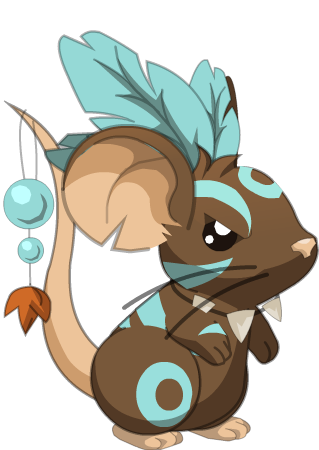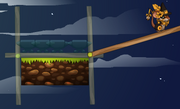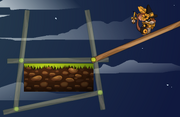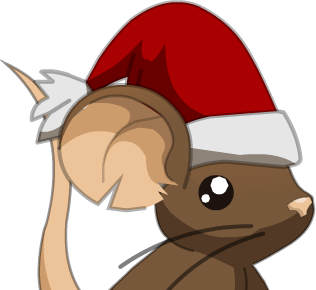Tags: Visual edit apiedit |
No edit summary Tag: sourceedit |
||
| Line 1: | Line 1: | ||
[[File:Hardmodeshaman.png|frame|right|The markings of a mouse in shaman hard mode.]] |
[[File:Hardmodeshaman.png|frame|right|The markings of a mouse in shaman hard mode.]] |
||
| + | {{For|the shaman mode that comes "after" hard mode|Divine Mode}} |
||
| − | |||
'''Hard mode''' is a [[shaman]] setting introduced on January 30th, 2011. It allows the shaman to hone their [[skills]] by limiting what they can and cannot build after they have saved 1,000 [[mice]]. After a [[mouse]] first hits 1,000 mice saved, they need to restart Transformice for them to be able to use hard mode, though. To turn on hard mode, you must select the blue feather icon next to the [[emoticons]] in the game screen. |
'''Hard mode''' is a [[shaman]] setting introduced on January 30th, 2011. It allows the shaman to hone their [[skills]] by limiting what they can and cannot build after they have saved 1,000 [[mice]]. After a [[mouse]] first hits 1,000 mice saved, they need to restart Transformice for them to be able to use hard mode, though. To turn on hard mode, you must select the blue feather icon next to the [[emoticons]] in the game screen. |
||
Revision as of 18:38, 24 August 2015

The markings of a mouse in shaman hard mode.
- For the shaman mode that comes "after" hard mode, see Divine Mode.
Hard mode is a shaman setting introduced on January 30th, 2011. It allows the shaman to hone their skills by limiting what they can and cannot build after they have saved 1,000 mice. After a mouse first hits 1,000 mice saved, they need to restart Transformice for them to be able to use hard mode, though. To turn on hard mode, you must select the blue feather icon next to the emoticons in the game screen.
The differences between Normal Mode and Hard Mode
Functional
1. The shaman cannot use the spirit tool in the map. (expect in conjuration maps)
2. The shaman can not use red nails unless they are part of a totem (totems may only use 1 red nail).
3. The shaman is able to create Totems which he/she can spawn only once per map.
4. Every mouse saved is counted as normal save and as a hard save. You can view the amount of hard saves in your profile. There are special titles for hard saves.
Visual
5. By default, the shaman has golden decorations on its body instead of blue decorations. As of Patch 0.161, the golden decorations can also be changed to any color you can imagine. You can use this Shamancolor tool to do it (The shaman to the right, for example, would be #97FC00). You can also use an art program (like Photoshop).
6. The feather in hard mode is laid back, but in easy mode it's pointing straight up. In addition, a smaller feather is also added.
7. There is only one triangular marking on a hard mode shaman's cheek, while in easy mode there are two.
8. Hard mode shamans have an extra marking above their eye, shaped in a half-circle.
9. There are two ornaments attached to the tail by a string in hard mode, and only one in easy mode.
However, if the shaman is in a shaman battle, catch the cheese, or conjuration map, none of these apply.
Totem
Totems are special pre-made system structures that can only be made once a shaman unlocks hard mode, and they can only be used while in hard mode. You cannot summon your totem in dual shaman maps, and you can only summon your totem once each round. Totems are modified using the Totem Editor. The spirit tool is replaced with a feather, and spawning the feather will create your totem. However, you may only use your totem once per map.
Totem Editor
Map444, which was originally a debug map, is now used for the totem editor, with some modifications of course. It now contains several buttons on the bottom marked Reset, Save and Cancel, and the shaman spawn menu contains all of the shaman objects and nails to make your totem.
Techniques
Due to the absence of red nails, there are some special shaman techniques commonly used by shamans in hard mode (although these can be used out of hard mode as well).
H-structure and anvils

This technique requires a small platform. First place a ghosted long board horizontally on top of the ground with each end sticking off, then 2 vertical ghosted long board with yellow nails in the middle on each end. After you have done this, place a few anvils on top of the horizontal bar (in-between the 2 vertical boards).
This technique works as the vertical board keeps the structure from moving side-to-side, and the anvils keep it flipping when one side becomes to heavy. To this end, it is usually wise to use at least 3-4 anvils.
This technique is usually only done when the platform is really tall or at the bottom of the screen, as you are then not able to make a complete rectangle for stability (see more on this in the technique below). There are different variations of this technique based on the situation (ex: if the platform is big, a lot of horizontal boards may be linked across the length of it).
Rectangle-anchor

Similar to the technique above, this is different in that it doesn't use anvils, but rather a 4th board to make a complete rectangle. This is done by placing a ghosted long board horizontally on top of the ground with each end sticking off, then 2 vertical ghosted long board with yellow nails in the middle on each end. Then you take a final ghosted horizontal board, with a yellow nail on the side, connect it to one of the vertical boards, below the ground. This must be done in such a way that the board will collide with the parallel vertical board. To finish it, you select an arrow with a c-anchor on it, and place it where the two boards collide to make a complete rectangle around the platform your standing on.
This works because it keeps any part of the structure from slipping of the platform. It should be warned that if the structure isn't "tight" enough around the platform, there is a chance the whole thing will flip if too much weight is applied to one side of it.
| Shaman | |||||||||||
|---|---|---|---|---|---|---|---|---|---|---|---|
| Modes |
| ||||||||||
| Items | |||||||||||
| |||||||||||
